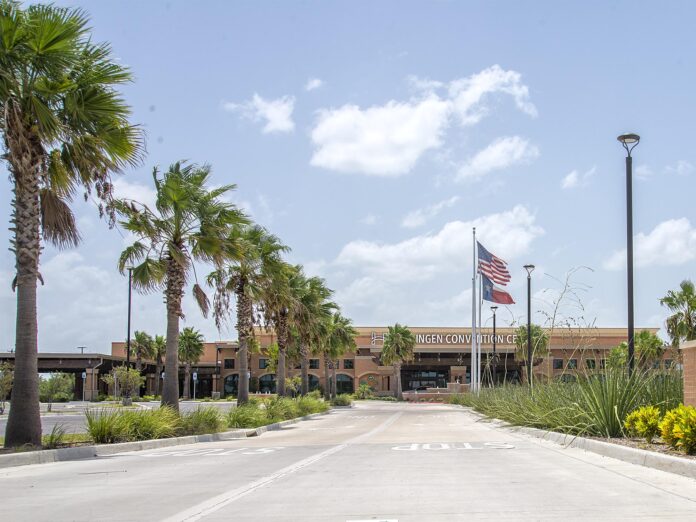HARLINGEN — After 14 years, one of the city’s main funding sources is draining.
Since city leaders launched the Harlingen Community Improvement Board in 2007, the agency, funded through a one-eighth-cent sales tax earmarked to finance so-called quality-of-life projects, has helped develop everything from Pendleton Park’s $400,000 expansion in 2008 to the $16.7 million Harlingen Convention Center.
While the agency’s fund balance stands at $6.7 million on the city’s ledger, the board’s committed nearly all its revenue, including $4.1 million to fund the second phase of the project that’s turning Lon C. Hill Park into a destination park and $1.9 million that’s helping to finance the Tony Butler Golf Course’s $3.1 million overhaul.
Meanwhile, the city’s climbing sales tax revenue, projected to double within 10 years, is expected to pump about $1.75 million a year into the agency’s fund balance.
“Even though we’ve stretched ourselves out, things will continue to get better in Harlingen,” Jesse Robles, the board’s chairman, said Friday. “Sales tax revenues continue to go up. Based on that, we’re empowered to move projects forward. We have a working revenue stream to accomplish these goals. We’re optimistic that as the momentum goes forward we’ll complete all the projects.”
Revenue stream
Now, city commissioners are planning to request the board fund the $1.2 million balance of the golf course project aimed at drawing players back to Tony Butler, which has run in the red for about eight years.
At City Hall, Mayor Chris Boswell said he believes the agency can fund the project.
“The appropriation for the second phase for the destination park hasn’t been spent and it will take time to spend that money for the golf course,” Boswell said. “It’s going to take one year or two to complete those projects. So while they’re working on those projects, the money’s still there.”
In two years, the city’s sales tax revenue’s projected to boost the agency’s fund balance to about $3.5 million, Boswell said.
“That money continues to be replenished,” he said.
Since 2010, the city’s annual sales tax collection has climbed from $18.1 million to $25.8 million last year.
Meanwhile, officials project sales tax revenues will double during the next 10 years, Boswell said.
Picking projects
Now, it will take about four years to pump enough sales tax revenue to rebuild the board’s $6 million fund balance.
Until then, the board might take on smaller projects.
“Can you add another project? I don’t know. That’s something (the board), if asked, will have to consider,” Boswell said. “It may not be able to do everything. It will depend if (the board) wants to fund smaller projects or wait to fund larger projects. It’s all about choices.”
Landmark vote
In 2007, residents voted to shift one-eighth of a cent of the Harlingen Economic Development Corporation’s then-half-cent sales tax earmarked to fund economic development projects to the newly created Harlingen Community Improvement Board.
Under the Texas Economic Development Act’s Section 4B, the Community Improvement Board can use its one-eighth-cent sales tax to finance quality-of-life projects such as parks.
“In the beginning, at its inception, we did smaller projects,” Boswell said, recalling projects such as Pendleton Park’s expansion and the lighting of the Wilson Sports Complex.
Harlingen Convention Center
Then in 2015, city commissioners began planning to build a convention center.
About a year later, officials tapped $9.7 million generated through the Community Improvement Board’s sales tax revenue stream and $3.8 million in hotel occupancy tax revenue to fund the $16.7 million project.
The city also used $1.95 million in property tax revenue generated within its three tax increment financing reinvestment zones to buy eight acres on which it built the 44,000-square-foot convention center.
Through 2040, the Community Improvement Board will continue to fund annual payments of $690,000 to pay off the convention center’s debt totaling $20.14 million.
Destination park
Soon, commissioners were planning to build the area’s first so-called destination park at Lon C. Hill Park as part of a plan to develop an outdoor entertainment venue aimed at drawing families and out-of-town dollars.
“Our projects are quality-of-life projects but all our projects have an economic development component,” Robles said.
By 2017, commissioners were working with the Community Improvement Board to fund the park’s $3.3 million first phase, whose financing included a $1 million Texas Parks & Wildlife Department grant.
“We’re going pay-as-you-go,” Robles said. “The city manager and staff have been very diligent in seeking out grants and donations that have contributed to the Community Improvement Board’s ability to fulfill its commitment to the community’s mandate.”
‘Signature projects’
After years of planning, the Community Improvement Board’s helped fund the biggest projects the city’s undertaken in decades.
“What the board has done over the last couple of years is concentrate on larger projects,” Boswell said. “They have been signature projects for the city.”




